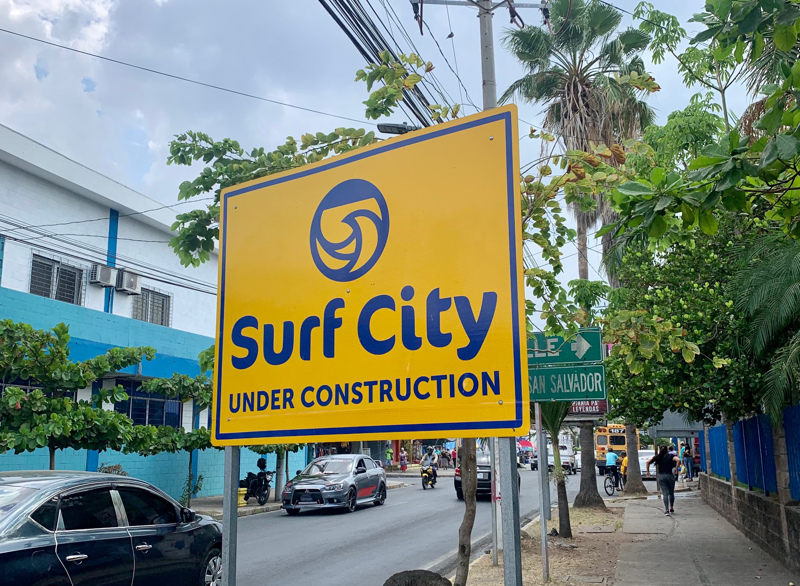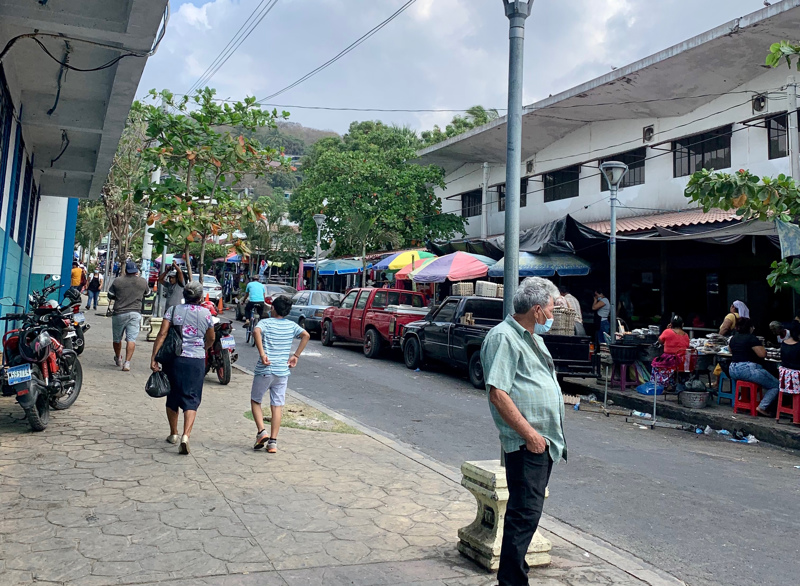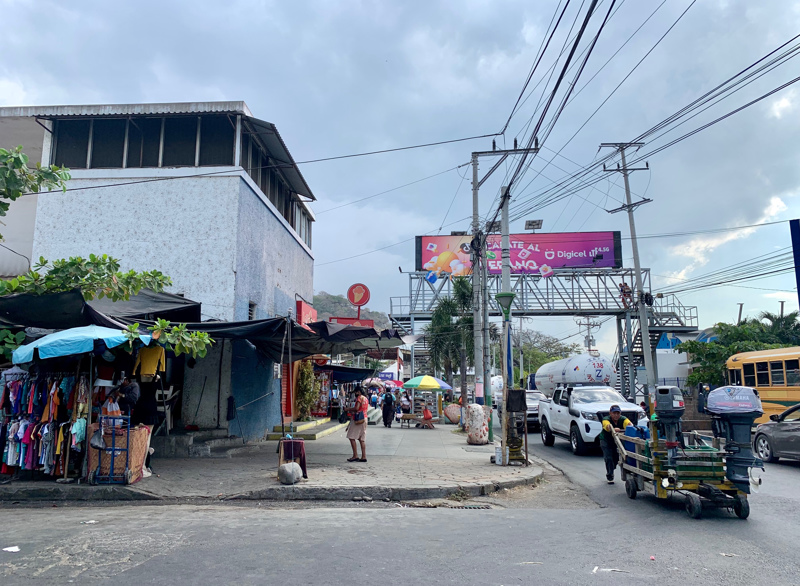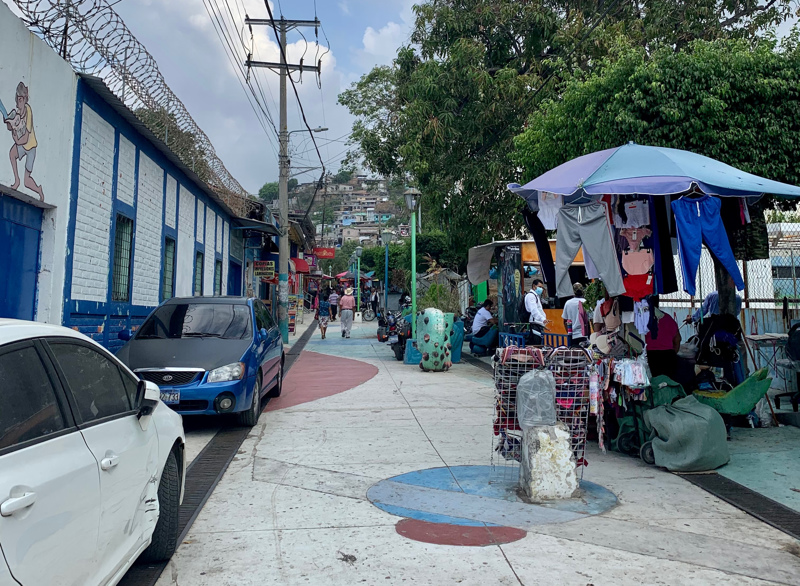The Surf Sabbatical
With some onshore wind and choppy waves, we decided to venture out this morning with the hotel manager, Tony. He had a couple of errands to run in La Libertad, the port city about 30 minutes south of where we are, and offered to bring us if we wanted. After a quick drive, he dropped us off in the middle of town, amongst all of the madness. Granted, we’ve been holed up here in our little beachside hotel so being in any decent sized city would’ve been jarring enough anyway, but La Libertad wasn’t only jarring, it was a full on assault of the senses. We were immediately placed amongst a large crowd of locals, street vendors, hawkers, chicken buses, fish markets, and motorcycles whizzing by at breakneck paces. To be honest, we weren’t quite ready for it. Nor were we ready to be the only gringos in town. While no one was openly hostile, and in fact a lot of people were incredibly friendly and smiley towards us, we were definitely an attraction to see. We’re both somewhat used to that traveling, but it was on another level from the traveling that I have done in the past, and it definitely put us on edge a bit. On one hand, I try to travel really vigilantly (and Niko certainly does too), being mindful of what I wear, my phone, my wallet, taking pictures, looking like a tourist, keeping a low profile, etc.. On the other hand, the beauty of traveling is in interacting with locals, encountering new cultures and trying new things, all of which require a certain level of openness that is hard to achieve while you’re trying to look like you shouldn’t be messed with. Frankly, I don’t think I ever look like that but still, I try to at least not look like an 18 year old small town girl who saw the big city lights of New York City for the first time. It’s a delicate balance, but regardless, it was a good experience and fun to venture out for a little bit.
Aside from the smells and sights and people, the most jarring aspect was encountering the poverty we’ve seen and heard of in bits and pieces, full-on. I’m trying not to be patronizing or naive here when I’m talking about the poverty here, so forgive me if it comes out that way, but it really is hard to describe in a way that does it justice. El Salvador is still so freshly “up-and-coming” as a destination to travel to (especially for surfing) that a lot of the tourism money that is flooding into the country hasn’t had enough time to really make an impact on the lives of most regular Salvadoreans. At least where we’ve been, the majority of people live in one room huts with aluminum sheets, cardboard or plastic for walls, women wash their clothes in the river, and a staggeringly high number of people here are illiterate and job prospects and opportunity for advancement are so low that often, people work for only a couple dollars a day. I’ve had to catch myself a few times before asking one of the kids who works at the hotel (who is only 16) what he wants to do when he’s older, or if he’s been to this city or that city in El Salvador. The reality is that a lot of kids here drop out of school early to support themselves or their families, never have the opportunity to travel even within their own country, and oftentimes keep the same low-wage job for decades, because a stable income is better than a pipe dream. It’s devastating. It’s not that it’s just incredibly sad to see,
Maddy Bradshaw
32 chapters
8 Jun 2021
La libertad
March 09, 2022
With some onshore wind and choppy waves, we decided to venture out this morning with the hotel manager, Tony. He had a couple of errands to run in La Libertad, the port city about 30 minutes south of where we are, and offered to bring us if we wanted. After a quick drive, he dropped us off in the middle of town, amongst all of the madness. Granted, we’ve been holed up here in our little beachside hotel so being in any decent sized city would’ve been jarring enough anyway, but La Libertad wasn’t only jarring, it was a full on assault of the senses. We were immediately placed amongst a large crowd of locals, street vendors, hawkers, chicken buses, fish markets, and motorcycles whizzing by at breakneck paces. To be honest, we weren’t quite ready for it. Nor were we ready to be the only gringos in town. While no one was openly hostile, and in fact a lot of people were incredibly friendly and smiley towards us, we were definitely an attraction to see. We’re both somewhat used to that traveling, but it was on another level from the traveling that I have done in the past, and it definitely put us on edge a bit. On one hand, I try to travel really vigilantly (and Niko certainly does too), being mindful of what I wear, my phone, my wallet, taking pictures, looking like a tourist, keeping a low profile, etc.. On the other hand, the beauty of traveling is in interacting with locals, encountering new cultures and trying new things, all of which require a certain level of openness that is hard to achieve while you’re trying to look like you shouldn’t be messed with. Frankly, I don’t think I ever look like that but still, I try to at least not look like an 18 year old small town girl who saw the big city lights of New York City for the first time. It’s a delicate balance, but regardless, it was a good experience and fun to venture out for a little bit.
Aside from the smells and sights and people, the most jarring aspect was encountering the poverty we’ve seen and heard of in bits and pieces, full-on. I’m trying not to be patronizing or naive here when I’m talking about the poverty here, so forgive me if it comes out that way, but it really is hard to describe in a way that does it justice. El Salvador is still so freshly “up-and-coming” as a destination to travel to (especially for surfing) that a lot of the tourism money that is flooding into the country hasn’t had enough time to really make an impact on the lives of most regular Salvadoreans. At least where we’ve been, the majority of people live in one room huts with aluminum sheets, cardboard or plastic for walls, women wash their clothes in the river, and a staggeringly high number of people here are illiterate and job prospects and opportunity for advancement are so low that often, people work for only a couple dollars a day. I’ve had to catch myself a few times before asking one of the kids who works at the hotel (who is only 16) what he wants to do when he’s older, or if he’s been to this city or that city in El Salvador. The reality is that a lot of kids here drop out of school early to support themselves or their families, never have the opportunity to travel even within their own country, and oftentimes keep the same low-wage job for decades, because a stable income is better than a pipe dream. It’s devastating. It’s not that it’s just incredibly sad to see,




it’s that the scale of inequities are so far skewed it feels so egregiously wrong you can’t help but be mad. It makes me feel so lucky and so grateful to be where I’m from, but it breaks my heart that luck has anything to do with it at all. It makes me want to turn inward and never leave our little beachside hotel again, but maybe witnessing it is better than turning a blind eye and feigning ignorance. It’s kind of like when someone you know is going through a hard time. Oftentimes people skirt around tough issues like grief or poverty or inequality, because they’re hard issues to acknowledge, especially when you feel like you can’t change the situation anyway. But anyone who has known hardship knows that’s not what’s important. It’s being seen and being heard and still feeling like part of the world despite tremendous loss, that’s important. So I guess that’s where I’m at. I can’t change the economic situation of the average person here in a meaningful way, but I can bear witness to their struggle and not shy away from it because it makes me uncomfortable. Sometimes that’s enough. Not always, but sometimes it is.
1.
Last Day in Hood River
2.
Otter Rock
3.
Port Orford-Nor Cal
4.
Van Damm-Bolinas
5.
San Francisco-Pacifica
6.
Half Moon Bay-Santa Cruz
7.
Santa cruising
8.
SC
9.
San Marcos Charquitos
10.
Styes and soul searching
11.
So it begins!
12.
We made it
13.
Day 1
14.
Adult Summer Camp
15.
Surf Camp or Bootcamp?
16.
Vila Nova de Milfontes
17.
Vila Nova de Milfontes...continued
18.
Reflections
19.
Razo
20.
Costa Rica!
21.
A quick appreciation post for Costa Rican food
22.
The people you meet traveling
23.
First time for everything
24.
Hard goodbyes and new places
25.
Nosara-Tamarindo
26.
Witches Rock
27.
El Salvador
28.
Good food, good surf, good people
29.
Life in El Sal
30.
La libertad
31.
Futbol
32.
Moto tours, Mexico City and national emergencies!
Share your travel adventures like this!
Create your own travel blog in one step
Share with friends and family to follow your journey
Easy set up, no technical knowledge needed and unlimited storage!